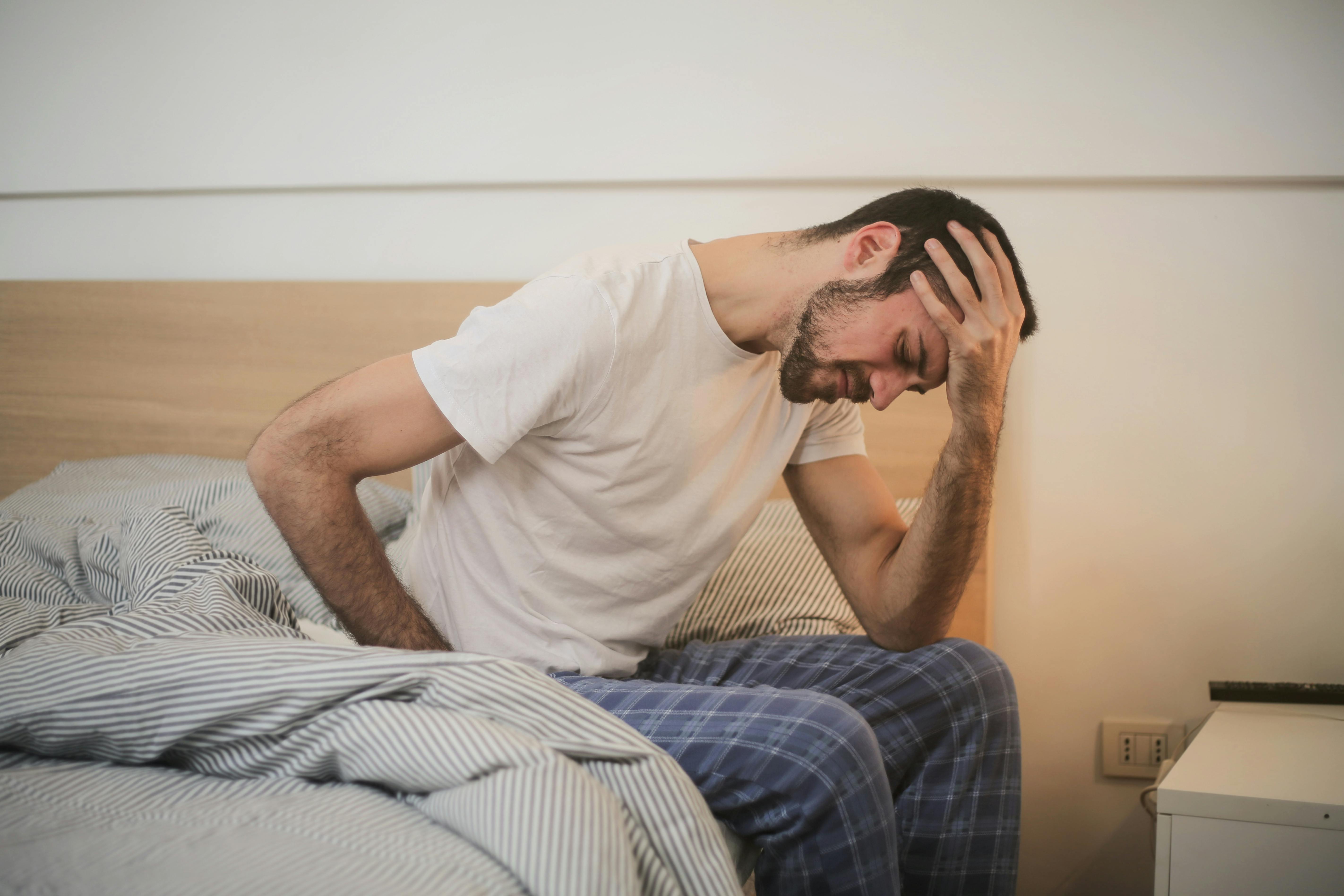Sleep can be surprisingly fragile. Sometimes, it’s the little things that throw us off—a worrying thought, a mattress that’s seen better days, or even light and noise creeping into the room.
While it might seem like an easy fix to grab prescribed sleeping pills, many of these medications work by forcing the body into a calm state, slowing down breathing and heart rate. They may work quickly, but the morning after can be less than ideal, leaving you groggy, dizzy, or with a headache.
There are gentler alternatives to consider. Small adjustments to your sleep routine or environment can make a big difference. Herbal supplements can also provide natural sleep support for occasional restless nights without the side effects of medications. However, even natural sleep aids are meant for short-term use rather than indefinite nightly use.
In this blog post, we'll look at five natural sleep aids and why Goodnite capsules should be at the top of your list.
Top 5 Natural Sleep Aids
-
A Herbal Supplement Like Goodnite Capsules :
Sleep supplements offer a milder way to wind down, and Goodnite capsules take that gentle approach seriously. With a natural mix of active ingredients including L- Theanine, Passion Flower, Ashwagandha, Magnesium BisGlycinate, Melissa Lemon Balm, Valerian Root Extract, Calcium and Hops Extract you will sleep better and wake up brighter. These capsules ease you into restorative slumber, helping your body and mind find their balance.
Ashwagandha and hops extract add extra support to ensure your pillow time isn’t followed by that drowsy feeling in the morning. Just take two capsules for better sleep 30 minutes before bedtime, and let the ingredients boost your body’s natural ability to rest. Ensure you give your body a chance to properly absorb these natural ingredients. Take 2 capsules a day for a minimum of 5 days as this is what you may need before you start to experience benefits
- Exercise :
Get moving if you want better sleep. When you work out, your body releases more melatonin, the hormone that helps you fall asleep faster. But that’s not all—exercise helps lower stress levels, so you can get some real rest without racing thoughts keeping you up.
Those who exercise tend to feel more positive and relaxed, with less mental fatigue hanging around. Another way exercise helps is by regulating your body’s temperature. The rise in temperature during exercise helps trigger a cooling effect afterward, signalling to your body that it’s time to sleep.
So, staying active doesn’t just improve your sleep; it creates a feedback loop of better sleep, less stress, and increased energy.
The best exercises for sleep
- Aerobic Exercise: Simple activities like walking or swimming can improve your sleep without requiring too much time or energy. Moderate exercises, done regularly, help you relax later on so you can drift off easily.
- Yoga: Before bed, yoga can help clear your mind and release stress from the day. Whether you do a few simple stretches or try a full routine, the focus on breath and movement gets you in the right headspace for rest. Yoga can act as a cue for your body to transition from activity to sleep mode.
- Pilates: Pilates helps build core strength, but it also helps with relaxation. The focus on flexibility and muscle control can ease tightness that might otherwise disrupt your sleep. By incorporating Pilates into your routine, you’ll likely notice your body feels less tense and more ready for bed.
Important Considerations
- Timing: Save intense workouts for earlier in the day. Close to bedtime, exercise might keep you up longer. Try to finish your session a few hours before going to bed.
- Consistency: For the best results, make exercise a regular part of your day. It's not just about one session—it’s the daily routine that really counts.
- Listen to Your Body: Always choose activities that feel good for you, and don’t push too hard.
- Magnesium Baths with Epsom Salts
Taking a soak with Epsom salt is a popular remedy for soothing muscle aches and reducing swelling. Though research is still catching up on how effective it is, plenty of people say they get relief from their symptoms after using it. Epsom salt’s high magnesium content seems to play a big role in these benefits. Research shows magnesium works by lowering cortisol, the stress hormone that can make you feel on edge, and increasing melatonin, a hormone that helps you sleep better. It also helps balance neurotransmitters, the chemicals that help your nervous system stay in sync. When these things work together, it’s believed to help your body relax, ease tension, and even improve sleep quality.
How to take an Epsom salt bath
- Prepare Your Bath: Fill your bathtub with warm water. The temperature should be between 33°C and 37°C. This is comfortably warm but not too hot. You can adjust the temperature based on your personal preference.
- Add Epsom Salt : For a typical soak, pour in about 2 cups (500 grams) of Epsom salt. Depending on your tub size, you can add more or less. Customise it to what feels best for your soak.
- Mix It Up : Swirl the water with your hand to help the Epsom salt dissolve evenly. This makes sure the salt spreads throughout the water and that you're getting the full benefit.
- Relax : Take 12 to 20 minutes to soak. It’s enough time for your muscles to relax and feel the effects of the magnesium from the salt.
- Afterward : When you’re finished, rise slowly and exit the tub carefully. Take a moment to hydrate with some water afterward, so you feel refreshed and recharged. -
Lavender
Lavender has a long-standing reputation for sleep support. Many have relied on it to unwind before bed, trusting its ability to relax the mind. And science is starting to agree. There is some evidence that the pleasant perfume of this purple flower could be an easy, aromatic remedy for mild sleep issues.
A 2014 review of 15 studies showed breathing in lavender oil had beneficial effects on people with minor sleep disturbances. One 2015 experiment found participants felt more well-rested after lavender aromatherapy before bed. Another study gave lavender supplements to anxious people and found they slept longer.
Of course, more research is still needed before experts can recommend a safe and effective dosage of lavender for sleep purposes. So, for now, we’re looking at lavender as a natural, calming option to add to your sleep routine, but with some room for more findings.
Ways To Incorporate Lavender Into Your Routine
- Aromatherapy :
-- Diffuser : Add a few drops of lavender essential oil to a diffuser and let the calming scent fill your room.
-- Pillow Mist: Create a DIY pillow mist by diluting lavender essential oil in water. Spritz your pillow and bedding before sleep.
-- Inhalation : Place a few drops of lavender oil on a tissue and inhale the aroma deeply.
- Topical Application :
-- Massage : Mix a few drops of lavender oil with a carrier oil (like coconut or almond oil) and gently massage it onto your temples, neck, and wrists.
-- Bath : Add a few drops of lavender oil to your bathwater and soak for at least 20 minutes. -
Sleep-Inducing Foods and Drinks
What you eat and drink before bed can set the tone for a peaceful night. Tryptophan, an amino acid found in certain foods, helps your brain create serotonin and melatonin—the hormones that guide your body into rest.
Add these to your plate:
- Turkey
- Eggs
- Cheese
- Nuts and seeds
- Salmon and tuna
- Soy products
As for drinks, a warm cup of milk can be soothing thanks to its natural sleep-friendly properties. Herbal teas are another great option to calm your mind.
Sip on these teas:
- Chamomile
- Peppermint
- Lavender
- Lemon balm
- Passionflower
Pairing the right food and drink can create a calming bedtime routine.
A Quick Word with Your Doctor First
While sleep aids can be great for short-term relief, they’re not one-size-fits-all. Talking to your doctor helps ensure you're making the right call. They'll guide you on how to use aids or take a capsule for better sleep safely, so you can finally catch up on the rest you need without any unexpected side effects. It’s always worth the conversation.
Disclaimer: This blog post is for informational purposes only and should not be considered as professional advice or guidance.








